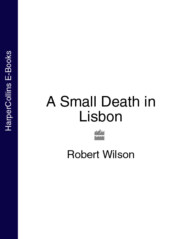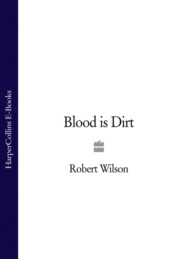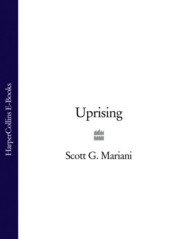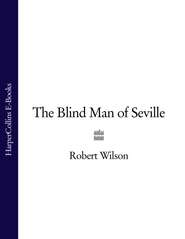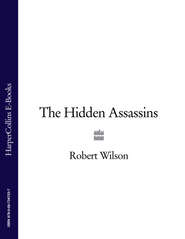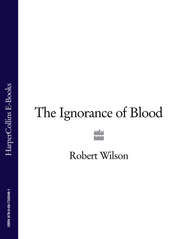По всем вопросам обращайтесь на: info@litportal.ru
(©) 2003-2024.
✖
Instruments of Darkness
Автор
Год написания книги
2019
Настройки чтения
Размер шрифта
Высота строк
Поля
We drove off, me grinning and Moses shouting: ‘You go make me eat dog! Mister Bruce. I no eat um. I no eat um never.’
Chapter 2 (#ulink_ec379912-802f-5410-b627-184fbe1c2d83)
The port was at a standstill; only the sun was out working on the scattered machinery and the corrugated iron roofs which creaked and pinged in the terrible heat. The shade of the buildings guarded sprawled stevedores who, rather than slow broil on the hot ground, lay across wooden pallets sleeping. The Peugeot’s tyres peeled themselves off the hot tarmac.
There was no traffic outside the port. We looked left down the Boulevard de la Marina and fifty metres down the road a parked car’s engine started. We turned right and headed east into Cotonou town centre. Moses’s eyes flickered from the windscreen to the rearview.
The sun leeched all the colour out of the sky, the buildings, the people, the palms, the shrubs, everything. Through the open window a breeze like dog breath lingered over my face as I manipulated the wing mirror. A madman with dusty matted hair stood in dirty brown shorts inspecting his navel. He slumped to his haunches as we drove past and started parting the dirt on the road as if something had fallen out. We passed the agents’ offices. The air conditioners shuddered and dripped distilled sweat into the thick afternoon air.
‘He following us, Mister Bruce.’
‘Slow down,’ I said. ‘Turn left.’
Moses dropped down to a fast walking pace and the car, an old Peugeot 305, settled behind us. Vasili, a Russian friend of mine, had told me not to worry about learning about Africa, that the Africans would teach you all you needed to know. They weren’t going to teach me anything about tailing cars.
‘Left again,’ I murmured. ‘And again.’
We were back to Boulevard de la Marina, still with our tail. Three cars slicked past in front of us heading into town.
‘Take them,’ I said, and Moses’s foot hit the floor.
We were past one car when a truck pulled out from the left, past two by the time its driver saw us. Moses didn’t bother with the third car, which would have put us through the radiator grille of the truck, but with his mouth wide open preparing to scream, he swung between the second and third cars and went up on to the pavement where he took out two frazzled saplings, snappety-snap, and overtook the third car on the inside, crashing back on to the road just in time for the roundabout which he took more briskly than he intended.
Behind us, the truck had slewed and stopped across the road, the second car was now facing the other way and the tail was up on the pavement with the car’s cheekbone crumpled into a low concrete wall. Cyclists sizzled past giving the scene the eyes right.
‘We lose him?’ asked Moses.
‘You lost him,’ I said, straightening my eyebrows.
We came into the centre of town, which, far from being free of lunchtime traffic, was jammed with cars moving at the pace of setting lava with half a million bicycles swooping in and out of them like housemartins. In the mid-seventies the President had announced a Marxist-Leninist revolution and forged links with the People’s Republic of China who built a football stadium and then took the opportunity to sell the Beninois a lot of bicycles. All that remained of the old regime were some battered hoardings with Marxist slogans like La lutte continue, which had now become the white man’s battlecry as he tried to make money in a difficult world.
We crawled past the PTT waiting to get on to Avenue Clozel and I noticed a tickering sound from the car when it was moving which must have come from Moses’s off-piste run. A man with brown, decaying teeth put his head in the window and tried to sell me a stick which he said would keep me hard all night. I asked him if I had to eat it or put in my pants and he said all I had to do was hold it and I told him it would cramp my style. Moses said I should have bought it and I asked him how he knew I needed it.
We were trying to get to my house, not a place that I’d had to fight hard to rent but comfortable enough for me. The rooms were big. The open plan living and dining room had breeze coming in from two sides. The bedrooms each had a wall of window. The bathroom worked and the kitchen was big enough for me to create a lot of washing up when I did the cooking. There was a large covered balcony on one side of the living room where I ate breakfast, and dinner if I felt like having my blood thinned by adventurous mosquitoes. The furniture was a mixture, some of it cane which I didn’t like but was cheap, the rest of it was carved wood which I did like, but couldn’t sit on. There were a lot of carpets, mainly from Algeria and Morocco, and cushions covered in the same designs. I spent most of the time on the floor. You couldn’t fall further than that.
There was a garage at the side of the house, and in the courtyard a huge and ancient palm tree with orange and purple palm oil nuts hanging off it in swagged clusters. The walls of the garden were covered in purple bougainvillaea. A green leafy creeper grew up the banister of the stairs at the front of the house which led up from the garage to my apartment.
The place I rented was on the west side of the lagoon. Most expats lived on the east side in Akpakpa or around the Hotel Aledjo. I preferred living with the Africans. They enjoyed themselves. The expats hated Cotonou. It was depressing to live with them and their wives who looked at you as if you could liven up their afternoons.
Moses kept up a monologue on Benin medicine, dog cuisine and great movie car chases he had seen. He let up occasionally to roar at cyclists so that they veered off and crashed into market stalls rather than hit the car.
‘Africans fear dogs,’ I said.
‘Thassway we no eat um.’
‘You fear them because they bite you.’
‘Thass it, Mister Bruce, they bite us.’
‘But if you eat um then you get the power of the dog and you no fear no more.’
Moses stopped the car, throwing me against the dashboard. A cyclist had come off in front of us. Two children put their hands through my window and were pulled away by a couple of Nigerians who shoved cheap ghetto blasters in my face. A girl offered Moses some water from a plastic jug on her head and another barbecued meat which congealed under greasy grey paper in a blue plastic bowl.
‘You clever, Mister Bruce. You be right. But not the dog the Chinaman kill. He sick dog. You eat dog, you find big, strong dog, then you eat him.’
‘You can’t get near a big, strong dog.’
‘Thassway we always fear the dogs.’
After half an hour in the traffic, with Moses yelling at cyclists to stop cadging lifts off the car, we turned off Clozel and started up Sekou Touré with nothing more to look at than crumbling, ill-painted buildings. The tickering noise from the car was still there as we turned left into the grid of mud streets where I lived. We bought some kebabs from a girl who was cooking them just outside the house. I opened the gate and, in the shade of the garage, saw Heike Brooke waiting for me, sitting on a step with her skirt up over her thighs keeping herself cool. She leaned forward and rubbed her shins and stood up letting the skirt fall to her knees. She leaned against her 2CV which she was considering taking off life support.
I’d met Heike two years ago when she was twenty-eight and I was thirty-six. It was in the Algerian Sahara about a hundred miles north of Tamanrasset. I was lying in a small square of shade under a tarpaulin fixed to the side of my dead car. The battery and the alternator were finished and I was on the way out. I had been there for three days without seeing anyone and was beyond the hallucinatory stage of thinking that every rock was a truck coming towards me. I was reading Dombey andSon which was taking the edge off the 120-degree heat and just about letting me forget that I only had three and a half litres of water left.
When I heard the rumbling noise of a truck, I thought it was from the truck route that I couldn’t see thirty miles to the east, but knew was there. Then I saw the Hanomag radiator grille from over the top of my book and I came out from under that tarpaulin as if I’d just had a kiss from a scorpion. As the truck came nearer I saw the driver and passenger were two guys, both with thirty foot of cloth wound around their heads and faces, so that all I could see was a sinister slit where the eyes should have been.
I was either going to be rescued or robbed. The truck stopped and the driver jumped out. The driver had breasts and hips and was wearing a calf-length tea gown; the passenger had breasts too and was wearing a denim shirt and a pair of baggy trousers that I’d seen the Mozabites wearing in Ghardaia. They unwound the cloth around their heads and revealed themselves to be two women in full make-up. In my confused state I thought that these hermaphrodites were the desert sprites that an Algerian soldier had told me about, or that perhaps I was having some contact with a strange simultaneous world where the genders had united. They introduced themselves as Heidi and Heike, two Berliners going to West Africa. They towed me to Tamanrasset which was a real enough experience and saved me from a thirsty death.
Heidi had driven back across the desert six months later, but Heike had stayed and was running an aid project in the north of Benin. Every few months she came to Cotonou to drink us into a very dark world beyond oblivion and find out if I was worth loving. I tried to tell her these two activities were not compatible but she insisted that for her alcohol was the only approach road to love. By coming to Africa she had thrown in her job as a TV commercials producer and left her director and first ‘serious’ boyfriend. She had discovered he was over-generous with nothing except one part of his anatomy and not exclusively to her. She was looking for a purer life, less complicated, but like a lot of us couldn’t always make up her mind. The drink parted her from her memories, gave her just enough courage to try again and, like me, she liked it.
Heike was a beautiful woman despite this punishment. She was the daughter of a British army officer and a Berlin café owner which meant she was bilingual and disinclined to listen to anyone’s bullshit. She was tall, just under six foot, with a long whippy body that wasn’t skinny but carried no extra flesh. She had thick brown hair which she always wore put up in a way that looked as if she’d just slammed a clip in any old place, but it was always just right. The style accentuated her long neck and fragile bones. Her eyes were intimidating. They were very clear light blue and green, like aquamarines.
I knew from the beginning that although she looked breakable she was tough. She had access to a temper that on a few occasions had caused her rather large hands to form fists and lash out on the ends of her long arms and hurt people. People like me.
Sometimes I deserved to be hit, but never because I couldn’t keep my trousers done up. That wasn’t my style at all. I found out early on in life that playing around messed up my head, dealt me the clap and gave me a better understanding of the blues than I really wanted. No, she would hit me, because she couldn’t get in there. She would tell me she was breaking down walls. I wasn’t always sure why the walls were up in the first place or what they were guarding, but whatever it was, she wanted to get to it. I wasn’t disinterested myself.
Heike was standing in the garage, her hands on her slim hips. She was wearing a white broderie anglaise top which showed about a foot of lean torso between it and her skirt, which was red with a light brown and white pattern. The lips of her small mouth were pursed, she was gnawing at the inside of her cheek. She looked at me with disdain as I walked up to her and kissed her. She threw her long arms around my shoulders and kissed me back.
‘I’ve been waiting for hours,’ she said in a voice that had been waiting with her.
Moses slid past me into the garage, nudging me with the wing mirror. The tickering noise had stopped. He got out, opened the boot and pulled the bedsheet out, grinning at Heike who said hello to him in the form of a suppressed smile. He walked up the stairs and Heike and I followed.
‘You’ve got a lot of laundry, Bruce.’
‘The biannual wash,’ I said.
Some money fell out from the top where the corners of the sheet were drawn together. She picked it up.
‘You should empty the pockets first,’ she said like a good little hausfrau, which is one thing she isn’t. The door to my part of the house opened straight into the living room. Moses threw the sheet on the floor. The knot gave and two corners of the sheet burst open and the money spewed out on to the floor. Heike was not impressed.
‘Can you count?’ I asked her.
‘I think I’ve just forgotten how.’
‘It’ll all come flooding back once you get started.’
‘Can I have a drink or do I just get straight down into it?’
Heike took a shower. I made a salad to go with the kebabs and broke open some beers and we sat on the floor and ate the food. Heike rubbed her wet hair with both hands and looked at the money as if it was sending her mad. We started counting. A light breeze blew through the mosquito netting over the slatted windows. Heike pulled up an ashtray. It was early afternoon. We had a long way to go.






